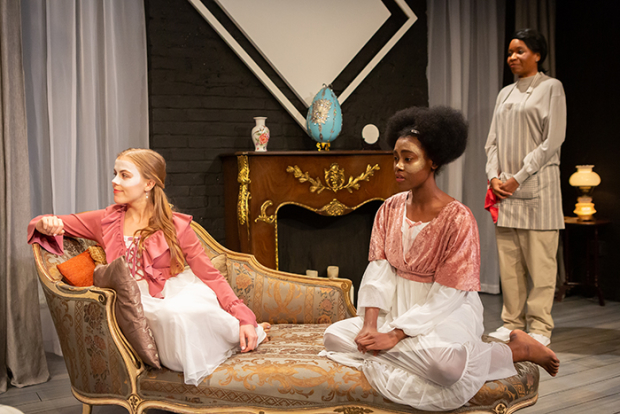In Today's America, Who Gets to Write The Great Novel?

(© Hunter Canning)
Writing a novel is hard. Writing a great novel is even harder. Writing a great novel with no literary role models is nearly impossible. Bertha (Nikki E. Walker), the modern-day protagonist of Amina Henry's new play, The Great Novel, now running at the Flea, is a Jamaican maid to the wealthy Brennan family in New York City. In the rare moments she has to herself, she hashes out the details of the novel that will finally give her personal and creative fulfillment — although there seems to be no place for anything "personal" in this book of hers. After all, if Bertha's going to write a real novel, she knows it would need to focus on a rail-thin, lily-white European damsel who falls in forbidden love and dies of either tuberculosis or heartbreak.
A writer of Jamaican descent herself, Henry frames her play around another woman stumbling through darkness to find her authentic literary voice. If you're not a Charles Dickens or a Jane Austen or a Brontë sister, where is your place? It's a weighty question, and the answers inevitably dig up complex issues of racial and social hierarchies. Under Sarah Norris's direction, however, the production is stumbling a bit too much alongside its characters to offer a coherent perspective.
Bertha's internal monologue provides the skeleton of the plot, but most of the holes are filled in by the members of the Brennan family. Bertha has served them unobtrusively for 10 years, and continues to be just as unobtrusive in the play Henry writes for her — an unfortunate consequence for Walker, who gives the play some of its strongest moments. To the chagrin of her grandmother's ghost (played by Madeline McCray) — who encourages Bertha to write her great novel about her Jamaican heritage — she's primarily an observer and sounding board for this wealthy white family, which recently lost its matriarch, leaving Bertha as the sole maternal figure to the sweet and perpetually ill Anne (Tabatha Gayle), and her vain older sister Charlotte (MaryKathryn Kopp). Also roaming in and out of the Brennans' Upper East Side apartment is the girls' emotionally disengaged father, Dick (Joshua Bermudez); their black-sheep brother, Saul (Michael Aguirre); and Charlotte's nonplussed boyfriend, Potter (Oghenero Gbaje), whom she trots around like a trophy while dreaming of her marital destiny.
Charlotte in particular has clearly fallen prey to the same literary shackles as Bertha, describing her future as a woman of leisure while conflating the tragedies of Crime and Punishment and La Bohème to explain how "mother died of consumption." Mari Taylor's prim costumes and An-lin Dauber's austere European sets (complete with a gold-accented fainting couch) at times make you wonder whether Henry has actually set her play in 19th-century England…and then someone mentions cellphones. It's an interesting way to show how popular narratives shape our lives and personal mythologies, but it takes a stronger directorial hand (and stronger performances) to build a common rhythm that communicates that clearly, as opposed to creating a tonal mishmash that needs to be pieced together after the fact.
A lack of clarity is the main snag in The Great Novel, beginning with the most conspicuous production choice — putting all of its white characters in white face, regardless of the actor's actual race. It's a provocative theatrical device — one that I've never seen done before, and one that functions as a relentless reminder of how tenuous the construct of race really is. As an inherently persistent presence, the image gets that concept across on its own, without digging deeper into Bertha's history as a woman of color who forsakes her own family history in service of her white employers. However, as in any work of fiction aiming to become a great novel, ideas need more nourishment to fly off the page.










